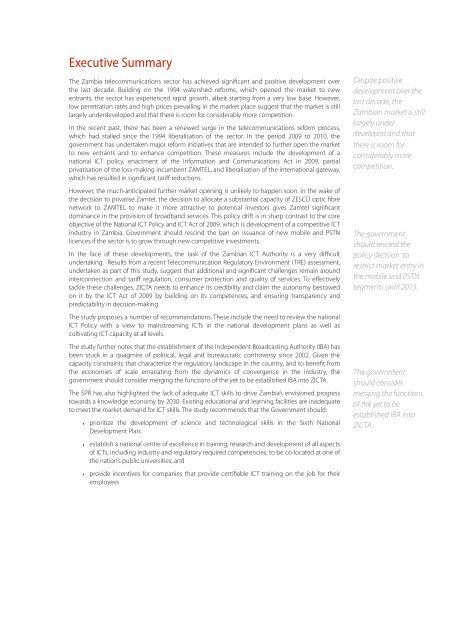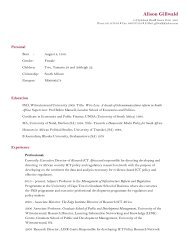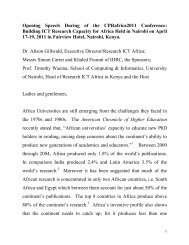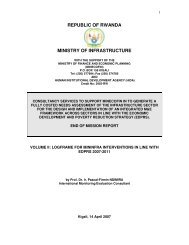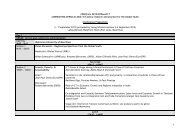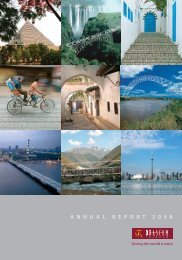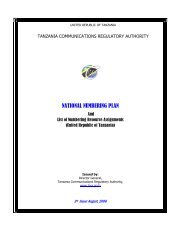Zambia ICT Sector Performance Review 2010 - Research ICT Africa
Zambia ICT Sector Performance Review 2010 - Research ICT Africa
Zambia ICT Sector Performance Review 2010 - Research ICT Africa
Create successful ePaper yourself
Turn your PDF publications into a flip-book with our unique Google optimized e-Paper software.
Executive Summary<br />
The <strong>Zambia</strong> telecommunications sector has achieved significant and positive development over<br />
the last decade. Building on the 1994 watershed reforms, which opened the market to new<br />
entrants, the sector has experienced rapid growth, albeit starting from a very low base. However,<br />
low penetration rates and high prices prevailing in the market place suggest that the market is still<br />
largely underdeveloped and that there is room for considerably more competition.<br />
In the recent past, there has been a renewed surge in the telecommunications reform process,<br />
which had stalled since the 1994 liberalisation of the sector. In the period 2009 to <strong>2010</strong>, the<br />
government has undertaken major reform initiatives that are intended to further open the market<br />
to new entrants and to enhance competition. These measures include the development of a<br />
national <strong>ICT</strong> policy, enactment of the Information and Communications Act in 2009, partial<br />
privatisation of the loss-making incumbent ZAMTEL, and liberalisation of the international gateway,<br />
which has resulted in significant tariff reductions.<br />
However, the much-anticipated further market opening is unlikely to happen soon. In the wake of<br />
the decision to privatise Zamtel, the decision to allocate a substantial capacity of ZESCO optic fibre<br />
network to ZAMTEL to make it more attractive to potential investors gives Zamtel significant<br />
dominance in the provision of broadband services. This policy drift is in sharp contrast to the core<br />
objective of the National <strong>ICT</strong> Policy and <strong>ICT</strong> Act of 2009, which is development of a competitive <strong>ICT</strong><br />
industry in <strong>Zambia</strong>. Government should rescind the ban on issuance of new mobile and PSTN<br />
licences if the sector is to grow through new competitive investments.<br />
In the face of these developments, the task of the <strong>Zambia</strong>n <strong>ICT</strong> Authority is a very difficult<br />
undertaking. Results from a recent Telecommunication Regulatory Environment (TRE) assessment,<br />
undertaken as part of this study, suggest that additional and significant challenges remain around<br />
interconnection and tariff regulation, consumer protection and quality of services. To effectively<br />
tackle these challenges, Z<strong>ICT</strong>A needs to enhance its credibility and claim the autonomy bestowed<br />
on it by the <strong>ICT</strong> Act of 2009 by building on its competences, and ensuring transparency and<br />
predictability in decision-making.<br />
The study proposes a number of recommendations. These include the need to review the national<br />
<strong>ICT</strong> Policy with a view to mainstreaming <strong>ICT</strong>s in the national development plans as well as<br />
cultivating <strong>ICT</strong> capacity at all levels.<br />
The study further notes that the establishment of the Independent Broadcasting Authority (IBA) has<br />
been stuck in a quagmire of political, legal and bureaucratic controversy since 2002. Given the<br />
capacity constraints that characterize the regulatory landscape in the country, and to benefit from<br />
the economies of scale emanating from the dynamics of convergence in the industry, the<br />
government should consider merging the functions of the yet to be established IBA into Z<strong>ICT</strong>A.<br />
The SPR has also highlighted the lack of adequate <strong>ICT</strong> skills to drive <strong>Zambia</strong>’s envisioned progress<br />
towards a knowledge economy by 2030. Existing educational and learning facilities are inadequate<br />
to meet the market demand for <strong>ICT</strong> skills. The study recommends that the Government should:<br />
• prioritize the development of science and technological skills in the Sixth National<br />
Development Plan;<br />
• establish a national centre of excellence in training, research and development of all aspects<br />
of <strong>ICT</strong>s, including industry and regulatory required competencies, to be co-located at one of<br />
the nation’s public universities; and<br />
• provide incentives for companies that provide certifiable <strong>ICT</strong> training on the job for their<br />
employees<br />
Despite positive<br />
development over the<br />
last decade, the<br />
<strong>Zambia</strong>n market is still<br />
largely under<br />
developed and that<br />
there is room for<br />
considerably more<br />
competition.<br />
The government<br />
should rescind the<br />
policy decision to<br />
restrict market entry in<br />
the mobile and PSTN<br />
segments until 2015.<br />
The government<br />
should consider<br />
merging the functions<br />
of the yet to be<br />
established IBA into<br />
Z<strong>ICT</strong>A .


